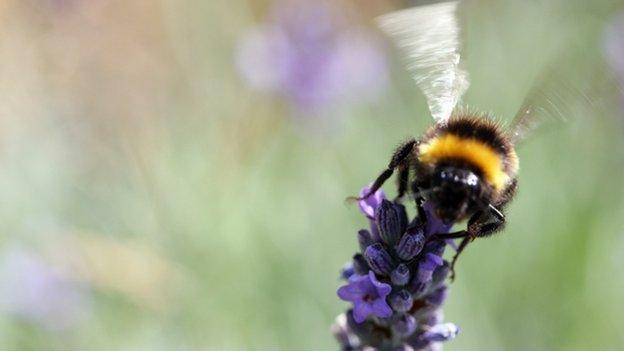Imported bumblebees pose 'parasite threat' to native bees
- Published

Between 40,000 and 50,000 bumblebee colonies are imported into the UK every year
Bumblebees imported from Europe carry pathogens that pose a threat to native honeybees and bumblebees in the UK, according to scientists.
Between 40,000 and 50,000 bumblebee colonies are imported into England each year to assist with crop pollination.
For a study in the Journal of Applied Ecology, scientists bought 48 colonies - hives containing up to 100 bees each - from three producers in Europe.
They found 77% had parasites that could infect native bees.
Lead researcher Prof William Hughes, of the University of Sussex, said commercial production and importation of bumblebees had been "going on for decades".
"We couldn't grow tomatoes in this country without these bumblebees," he said.
Professor William Hughes explains the risks of importing bumblebees
And with the decline in pollinating insects in recent years, food producers are increasingly reliant upon imported bees.
"Over a million colonies are imported globally - it's a huge trade," said Prof Hughes. "And a surprisingly large number of these are produced in factories, mainly in Eastern Europe.
"We sought to answer the big question of whether colonies that are being produced now have parasites and, if so, whether those parasites are actually infectious or harmful."
Undercover science
With his colleagues from the universities of Leeds and Stirling, the researcher set out to buy colonies "in exactly the same way a farmer would".
The team then screened the bees for parasite DNA.
"We found quite a number of parasites within the bees," Prof Hughes said.
The imported bumblebee colonies carried a range of parasites including the three main bumblebee parasites (Crithidia bombi, Nosema bombi and Apicystis bombi), three honeybee parasites (Nosema apis, Ascosphaera apis and Paenibacillus larvae), and two parasites that infect both bumblebees and honeybees (Nosema ceranae and deformed wing virus).
The team also found parasites in the pollen food supplied with the bees.
The scientists say that current regulations governing bumblebee imports are ineffective.
In England, for example, the non-departmental public body responsible for the protection of the environment, Natural England, issues licences for the release of non-native bumblebee subspecies.
But this study found parasites in both native and non-native subspecies that were commercially reared in Europe, and no licences are required to release native subspecies into the environment.
Natural England said under current regulations it was "not possible to impose disease control conditions or environmental safeguards on the release of imported bumblebees which originally descended from British bumblebees".
"It is therefore of particular concern that this research has revealed that imported bees - descended from British stock - have been found to be carrying disease," its statement added.
"Our licensing regime stipulates that where non-native bumblebees are used, they must be disease free, only used within polytunnels or greenhouses, using hives from which queens cannot escape, and that all hives and surviving bees must be destroyed at the end of their use."
But the researchers say that regulatory authorities need to strengthen measures to prevent importation of parasite-carrying bumblebee colonies, including checking bees on arrival in the UK and extending regulations to cover imported colonies of the native subspecies.
Prof Hughes said: "If we don't act, then the risk is that potentially tens of thousands of parasite-carrying bumblebee colonies may be imported into the UK each year, and hundreds of thousands worldwide.
"Many bee species are already showing significant population declines," he said.
"The introduction of more or new parasite infections will at a minimum exacerbate this, and could quite possibly directly drive declines."
The British Beekeepers Association said in a statement: "Defra (the UK Department for the Environment, Food and Rural Affairs) must take urgent steps to tighten regulations together with practical steps to ensure that imported bumblebee colonies are not heavily laden with pathogens.
It continued: "[Regulations must ensure] that these bees are not released into the environment at the end of the season putting our native pollinators at enhanced risk."
A Defra representative responded to the study, saying: "Imported colonies of non-native bees are required to be screened for parasites and disease.
"We will continue to work with Natural England to ensure that growers who break the rules are punished."
- Published14 June 2013
- Published31 May 2013